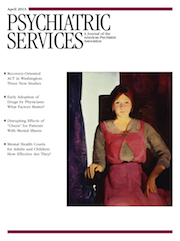Racial Differences in Veterans’ Satisfaction With Examination of Disability From Posttraumatic Stress Disorder
Abstract
Objective
The examination that determines if a veteran has service-connected posttraumatic stress disorder (PTSD) affects veterans’ lives for years. This study examined factors potentially associated with veterans’ perception of their examination’s quality.
Methods
Veterans (N=384) being evaluated for an initial PTSD service-connection claim were randomly assigned to receive either a semistructured interview or the examiner’s usual interview. Immediately after the interview, veterans completed confidential ratings of the examinations’ quality and of their examiners’ interpersonal qualities and competence. Extensive data characterizing the veterans, the 33 participating examiners, and the examinations themselves were collected.
Results
Forty-seven percent of Caucasian veterans and 34% of African-American veterans rated their examination quality as excellent. African Americans were less likely than Caucasians to assign a higher quality rating (odds ratio=.61, 95% confidence interval=.38–.99, p=.047). Compared with Caucasians, African Americans rated their examiners as having significantly worse interpersonal qualities but not lower competence. Ratings were not significantly related to the veterans' age, gender, marital status, eventual diagnosis of PTSD, Global Assessment of Functioning score, the examiner’s perception of the prevalence of malingering, or the presence of a third party during the examination.
Conclusions
Ratings of disability examinations were generally high, although ratings were less favorable among African-American veterans than among Caucasian veterans.



